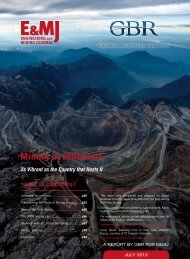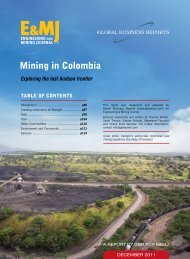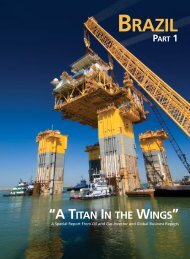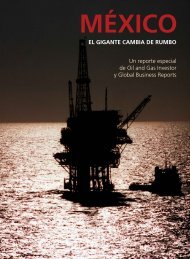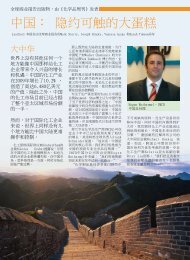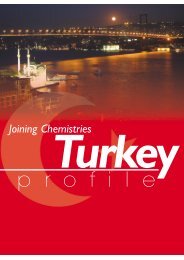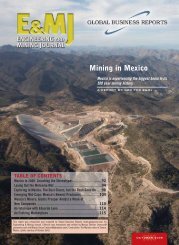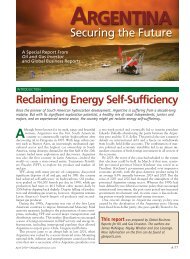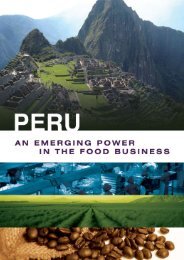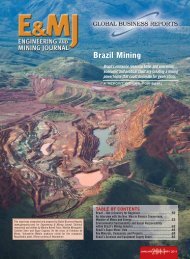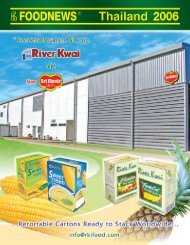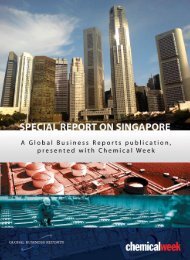Turkey Speciality Chemicals 2006 - GBR
Turkey Speciality Chemicals 2006 - GBR
Turkey Speciality Chemicals 2006 - GBR
Create successful ePaper yourself
Turn your PDF publications into a flip-book with our unique Google optimized e-Paper software.
<strong>Turkey</strong><br />
Special Report<br />
Elouisa Dalli and Nicholas de Weydenthal of Global Business Reports explore the<br />
potential of and the challenges facing the Turkish chemicals industry and investigate<br />
investment opportunities and risks in <strong>Turkey</strong>
<strong>Turkey</strong> special report<br />
Synthesis & decomposition in th<br />
Along with its position at the crossroads of Europe, Asia<br />
and the Middle East, <strong>Turkey</strong> continues to attract attention<br />
and interest for its complex mix of modern industry<br />
and commerce. With a young and growing population of<br />
nearly 70 million and a booming industrial sector, <strong>Turkey</strong><br />
seems like a gold mine waiting to be tapped.<br />
As EU accession talks began in October 2005, <strong>Turkey</strong> has<br />
moved closer to the old continent and will be able to count on<br />
increased foreign investment to bolster and expand its industries,<br />
from chemicals to high technology and energy. The hope<br />
of EU membership has indirectly worked as a catalyst for the<br />
whole economy and especially the chemicals sector.<br />
<strong>Turkey</strong> has enjoyed a strong recovery from the severe economic<br />
contraction it experienced due to a devastating financial<br />
and currency crisis in November 2000 and February 2001.<br />
During 2004, real GDP grew by a healthy 8.9%, though with an<br />
inflation rate of 9.3%. In 2005, real GDP growth was at 5%, with<br />
inflation at 7.5%. Unemployment was around 9.3% in 2005.<br />
The IMF began working closely with <strong>Turkey</strong> following the<br />
2001 economic crisis. In early 2002, the two parties jointly<br />
agreed to a €15.7 billion standby assistance package. On 11<br />
May, 2005, they agreed to a further €8.4 billion, three-year<br />
package. The condition is the implementation of a variety of<br />
measures to address the root causes of the country’s economic<br />
problems.<br />
Consequently, <strong>Turkey</strong> has pledged to cut state spending and<br />
subsidies, reform the banking sector, accelerate the privatisation<br />
of state-owned industries, lower the inflation rate, reduce its<br />
heavy debt burden, and in general, create “a stable macroeconomic<br />
environment conducive to economic growth”.<br />
In May 2005, the IMF stated that “<strong>Turkey</strong>’s economic performance<br />
is the strongest for a generation” and called for measures<br />
ranging from the continued independence of the central<br />
bank to full inflation targeting in order to facilitate further reductions<br />
in interest rates and generate sustained growth.<br />
Despite the positive signs seen recently, <strong>Turkey</strong> continues to<br />
face numerous economic challenges, including: a large ‘grey’<br />
economy; sharp income inequalities; a large and inefficient state<br />
sector; overly complicated legal and administrative procedures;<br />
a relatively inhospitable foreign investment climate; and, a<br />
stalled privatisation programme. Hence, careful planning and<br />
patience are the keys to success in <strong>Turkey</strong>.<br />
18,000<br />
16,000<br />
14,000<br />
12,000<br />
10,000<br />
8,000<br />
6,000<br />
4,000<br />
2,000<br />
0<br />
EU-15<br />
9,741<br />
1,463 1,545<br />
10,391<br />
Western Europe<br />
2,547<br />
Others<br />
6,108<br />
2004 Total Exports 2004 Total Imports<br />
Figure 1 - Foreign chemical<br />
trade of <strong>Turkey</strong>, 2004<br />
4,092<br />
Total<br />
16,499<br />
<strong>Turkey</strong>’s move toward EU membership offers an excellent<br />
opportunity to adopt European business regulations and standards,<br />
ultimately making it easier to conduct business here.<br />
Because it is the commercial hub of Central Asia, <strong>Turkey</strong>’s<br />
resources can eventually be used to expand business opportunities<br />
throughout Central Asia, the Middle East and the<br />
Caucasus.<br />
The value-added Turkish chemicals industry is one of those<br />
that have been able to raise their standards and it can count on<br />
some steady foreign investment. The industry is fundamental to<br />
<strong>Turkey</strong>’s overall industrial development and has been able to<br />
work on its comparative advantages as well as define its goals<br />
for the future.<br />
Certain natural attributes and new prospects have structured<br />
the chemicals industry into the form it takes today. <strong>Turkey</strong>’s natural<br />
reserves of soda ash, chrome and boron have helped to create<br />
advantages by supplying valuable raw materials. The speciality<br />
pharmaceuticals, paints and coatings industries have also<br />
performed well in terms of production capacity and exports.<br />
However, the industry still depends heavily on imports for<br />
both raw materials and more advanced technological requirements,<br />
with its import/consumption ratio steadily increasing,<br />
from 40% in 1990 to 55.5% in 2003. Niche product specialisation<br />
and foreign investment have become the ultimate solutions<br />
to <strong>Turkey</strong>’s chemical dilemma.<br />
Both Mustafa Bagan, secretary general of the Turkish<br />
Chemical Manufacturers Association (TCMA), and Turgut<br />
Doyran, chairman of the board of the Istanbul <strong>Chemicals</strong> &<br />
Chemical Products Exporters’ Association stress that foreign<br />
investment is essential for the next stage of development of the<br />
speciality chemicals industry.<br />
Large-scale chemical production in <strong>Turkey</strong> began in the<br />
1960s as the government adopted import substitution policies<br />
that directed public sector investments in the areas of petrochemicals,<br />
fertilisers and basic organic and inorganic chemicals.<br />
These capital-intensive investments, however, did not yield<br />
high profitability. With the liberalisation of the economy in the<br />
1980s, the private sector and foreign investors mushroomed,<br />
predominantly in the production of pharmaceuticals, specialised<br />
textile chemicals and cleaning materials.<br />
The Turkish chemicals industry in recent years has been<br />
characterised by import dependency, technological improvement<br />
and sporadic foreign investment. Approximately half of<br />
<strong>Turkey</strong>’s overall chemicals demand is met by imports.<br />
This ratio rises to over two-thirds in base chemicals and<br />
organic chemicals, and even higher in some categories. Many<br />
varieties of base chemicals are 100% imported (as are 90% of<br />
dyestuffs and pigments), although they then go through a<br />
process of specialisation and value-addition.<br />
Certain products are largely produced locally, usually<br />
because of easy access to certain raw materials. Since sodium<br />
and boron products and their intermediates are locally produced<br />
items, import levels are as low as 36%. Therefore boron<br />
and sodium derivatives and speciality paints and coatings have<br />
export potential.<br />
Despite high import requirements, chemicals still constitute<br />
one of <strong>Turkey</strong>’s major export items. The sector is becoming<br />
more import-dependent as the economy develops, since production<br />
falls short of domestic demand and new investments<br />
are small in scale, often being directed at expanding existing<br />
production lines.<br />
56 January/February <strong>2006</strong> <strong>Speciality</strong> <strong>Chemicals</strong> Magazine<br />
www.specchemonline.com
<strong>Turkey</strong> special report<br />
he Turkish chemical Industry<br />
On the other hand, the speciality chemicals sector, which<br />
involves the utilisation of technology and capital-intensive production<br />
techniques, requires large-scale investments. Capacity<br />
utilisation during the last three years averaged 77%.<br />
Market size<br />
Around 1,800 manufacturing companies exist in the Turkish<br />
chemicals sector, excluding plastics and rubber processing.<br />
About 100 are large, 210 mid-sized and the rest small-scale. The<br />
TCMA has 65 members and they account for 60% of the<br />
chemical sector’s turnover. 84% of production originates from<br />
the private sector.<br />
Production grew by an average of 4.3%/year between 1990<br />
and 2002. Parallel with demand, it declined by 10% in 2001,<br />
but rose by 9.5% in 2003 and totalled €8.7 billion, with textile<br />
chemicals and auxiliaries and paints and coatings benefiting<br />
most. Total production is now €11.8 billion/year, growing at an<br />
estimated 4%/year. <strong>Chemicals</strong> accounts for about 8.4% of<br />
<strong>Turkey</strong>’s total industrial output.<br />
Most of <strong>Turkey</strong>’s chemicals production is based on domestic<br />
raw materials. <strong>Turkey</strong> has the largest soda factory in the Middle<br />
East, with a capacity of 750,000 tonnes/year. It also has a<br />
reserve of 200 million tonnes of trona (natural soda ash) near<br />
Ankara, the second largest after the US. The foundations of<br />
trona production units were laid out in mid-2004. Plans are to<br />
produce 1 million tonnes/year of soda ash and 100,000<br />
tonnes/year of bicarbonate from <strong>2006</strong>.<br />
<strong>Turkey</strong> is also among the top five suppliers of chrome ore. It<br />
produces and exports some of the most important chrome<br />
chemicals and derivatives, such as sodium bichromate, basic<br />
chrome sulphate, chromic acid and chrome oxide. It has two<br />
thirds of the world’s boron reserves and is the second largest<br />
producer of boron minerals. Thus it enjoys a comparative<br />
advantage in boron chemicals (borax decahydrate, borax pentahydrate,<br />
boric acid and sodium perborate).<br />
Local producers meet about 20% of world demand for textile<br />
dyes and pigments and paint additives. Since the textile<br />
sector is well developed, specialised polymer production related<br />
to textiles and the production of textile chemicals have progressed<br />
simultaneously. Large production units for polyamide,<br />
polyester and acrylic fibres have been built for both export and<br />
domestic markets. Total synthetic fibre production is around<br />
850,000 tonnes/year.<br />
There is considerable foreign involvement in the chemicals<br />
sector, particularly in the pharmaceuticals, paints and coatings,<br />
cleaning materials and textile auxiliaries sub-sectors. <strong>Chemicals</strong><br />
is among <strong>Turkey</strong>’s top five industries in terms of direct foreign<br />
investment, with over 200 firms involving some degree of foreign<br />
capital. However, during recent years direct foreign investment<br />
has mainly involved buying into existing companies<br />
rather than making new capital investments.<br />
With increased globalisation over the last seven to eight<br />
years, many international chemicals companies, including BASF,<br />
Cognis and Clariant, have enhanced the regional responsibility<br />
<strong>Speciality</strong> <strong>Chemicals</strong> Magazine January/February <strong>2006</strong> 57<br />
www.specchemonline.com
<strong>Turkey</strong> special report<br />
Consumer goods<br />
12%<br />
Perfume and cosmetics<br />
Soaps & detergents<br />
Pharmaceuticals<br />
26%<br />
<strong>Speciality</strong> & fine<br />
chemicals 24.4%<br />
Paints, coatings, dyes,<br />
agrochemicals & other<br />
for their offices in <strong>Turkey</strong>. BASF, for example, has established<br />
the Business Centre <strong>Turkey</strong>, Middle East & North Africa here,<br />
while Cognis <strong>Turkey</strong> is also responsible for those regions.<br />
The chemicals sector is highly vulnerable to the fluctuations<br />
in the other industrial sectors and the overall economic developments,<br />
since 80% of the total chemical production (excluding<br />
pharmaceuticals) is intermediate in nature.<br />
With the exception of medium- and large-scale players, the<br />
industry is far from being modern and competitive. The integration<br />
between the production of basic and intermediate chemicals<br />
seems inadequate, except in petrochemicals and fertilisers.<br />
However, companies have started to invest in niche products,<br />
thereby raising the cash to reinvest in R&D and technology to<br />
produce the high value-added speciality products, that local<br />
chemicals industry executives regards as the key to the future.<br />
Moreover, there have been considerable improvements in<br />
terms of quality, productivity and environmental protection. All<br />
large companies in the sector have ISO 9000 quality certificates.<br />
Responsible Care, the chemicals industry’s trademarked<br />
initiative on environmental, health and safety issues, has been<br />
successfully implemented since 1992, though it still needs to be<br />
extended to all SMEs.<br />
Trade & prospects<br />
In 2004, <strong>Turkey</strong>’s chemicals exports totalled €4.2 billion, 7.95%<br />
of total exports, while imports amounted to €13.9 billion. The<br />
EU countries account for around 60% of the imports (a total of<br />
€5.65 billion in 2003) and around 30% (€518 million) of the<br />
exports. The growth in exports was attributable mainly to pharmaceuticals,<br />
paints and coatings, textile chemicals and their speciality<br />
derivatives, the growth in imports to raw materials for<br />
plastics and rubber, and dyestuffs.<br />
Despite the problems it faces, however, the future of the<br />
Turkish chemicals sector remains bright. The low current per<br />
capita consumption of chemicals and the move towards sustainable<br />
growth rates in the general economy should help to<br />
attract new investments into a chemicals industry with good<br />
natural resources but inadequate capital.<br />
Indeed, the capital- and technology-intensive nature of the<br />
Turkish chemicals industry makes it an ideal field for foreign<br />
investors. Foreign companies would benefit from the investment<br />
opportunities in the speciality chemicals sub-sector, provided<br />
that they bring new and advanced technologies allowing<br />
lower production costs.<br />
Basic chemicals<br />
37.6%<br />
Petrochemicals<br />
Plastic & synthetic rubber<br />
Man-made fibres<br />
Other basic inorganics<br />
Industrial gases<br />
Fertilisers<br />
Figure 2 - Turkish chemicals<br />
industry by sector<br />
Turkish companies are interested in cooperating with foreign<br />
companies in manufacturing organic and inorganic chemicals,<br />
including specialised resins. Investing in technology, specialising<br />
in certain niche product categories or supplying booming<br />
industries such as textiles, automotive or construction sectors<br />
offer real potential.<br />
Even though 60-80% of paints consumed in <strong>Turkey</strong> are<br />
imported from the EU, it has been argued that <strong>Turkey</strong> could be<br />
a paints, coatings and dyestuffs production centre for foreign<br />
investors investing there and then exporting to third countries.<br />
Major paints and coatings producers think that <strong>Turkey</strong> has<br />
reached the stage where it should be looking to produce paint<br />
raw materials and additives locally as price competition forces<br />
producers to look at the cost of imports more closely and the<br />
volume of imports grows. Furthermore, with the rise in the construction<br />
and automotive industries, speciality paints, dyes and<br />
coatings are in high demand.<br />
On the other hand, the Turkish pharmaceuticals sector is<br />
reinventing itself to create not only generics but also original<br />
products. Turkish companies are investing heavily into fine<br />
chemicals, predicting that the future will be based on innovation.<br />
Some foreign players have entered the market but many<br />
more are still needed to supply the market with more technological<br />
know-how and capital that realising its full potential<br />
requires.<br />
Acknowledgements & useful contacts:<br />
Global Business Reports would like to thank the following for<br />
providing invaluable information and helping compile this<br />
report: Mustafa Bagan, secretary general, TCMA; Turgut<br />
Doyran, chairman of the board, Istanbul <strong>Chemicals</strong> and<br />
Chemical Products Exporters’ Association, and Atilla Discioglu,<br />
chairman of the board, BOSAD<br />
Global Business Reports:<br />
Tel: +90 212 327 24 64<br />
E-mail info@gbreports.com<br />
Website: www.gbreports.com<br />
Turkish Chemical Manufacturers Association<br />
Tel: +90 216 416 76 44<br />
E-mail: tksd@tnn.net<br />
Website: www.tksd.org.tr<br />
Istanbul <strong>Chemicals</strong> & Chemical Products<br />
Exporters’ Association<br />
Tel: +90 212 454 00 00<br />
E-mail: immib@immib.com.tr<br />
Website: www.immib.com.tr<br />
Association of the Paint Industry (BOSAD)<br />
Tel: +90 216 456 29 33<br />
E-mail: bosad@ttnet.net.tr<br />
Website: www.bosad.org<br />
Pharmaceutical Manufacturers Association (IEIS)<br />
Tel: +90 212 278 82 25<br />
E-mail: ieis@ieis.org<br />
Website: www.ieis.org<br />
Foreign Economic Relations Board (DEIK)<br />
Tel: +90 212 339 50 11<br />
Website: www.deik.org.tr<br />
58 January/February <strong>2006</strong> <strong>Speciality</strong> <strong>Chemicals</strong> Magazine<br />
www.specchemonline.com
<strong>Turkey</strong> special report<br />
Curing <strong>Turkey</strong>’s<br />
pharmaceutical problems<br />
<strong>Turkey</strong>’s pharmaceuticals industry accounts for<br />
approximately 10% of the nation’s chemicals<br />
production and <strong>Turkey</strong> ranks 16th among the<br />
world’s drugs-producing countries. This indicates<br />
that the market is promising for international companies<br />
intent on entering joint ventures and other<br />
forms of mutually beneficial cooperation with local<br />
counterparts.<br />
With patent protection legislation in place, foreign<br />
businesses are now more sheltered and can freely<br />
market their innovations. However, shortcomings<br />
and pitfalls can be encountered at every turn. In a<br />
generics-focused market with a new pricing scheme,<br />
multinationals are at an apparent disadvantage to<br />
their Turkish counterparts. The latter, however, must<br />
adapt to the data exclusivity laws to stay competitive.<br />
Currently, generics dominate the sector but the<br />
future of Turkish pharmaceuticals clearly belongs to<br />
innovation. Forays abroad and foreign investments<br />
will be the name of the game for the years to come.<br />
Many players have started to restructure their business<br />
plans and are ready to take advantage of the<br />
opportunities that are currently beckoning.<br />
The size of the market, at factory prices, was<br />
around €2.95 billion in 2003 and it is expected to<br />
grow to just over €5 billion by 2008. This implies a<br />
total market size of around €3.8 billion in 2003 at<br />
consumer prices, taking into account 9% distributor<br />
and 25% retail margins.<br />
Urbanisation, population growth and the growing<br />
per capita income are the main drivers of consumption.<br />
Per capita consumption of pharmaceutical<br />
products in <strong>Turkey</strong>, at €50.5/year in 2003, is a fraction<br />
of the OECD average of €211 in 2001. As the<br />
population grows older, the consumption of higher<br />
margin drugs for heart diseases and cancer will<br />
increase at the expense of antibiotics.<br />
Generic drugs currently account for 60% of the<br />
market, compared to only 15% eight years ago, due<br />
largely to official policy - since 2003 - of buying the<br />
cheapest drugs available. With many important<br />
patents expiring between 2005 and 2010, generics<br />
are expected to gain further ground. Government<br />
buying accounts for 70% of the market.<br />
Birol: Foreign firms use data protection to own<br />
ends<br />
Eczacıbası’s headquarters<br />
A total of 134 companies operate in the Turkish<br />
pharmaceuticals industry, according to the Ministry<br />
of Health. These are made up of 85 manufacturers,<br />
11 raw material producers and 38 importers. Since<br />
1984, foreign investments have increased and 19<br />
foreign firms have entered the Turkish pharmaceuticals<br />
market.<br />
37 of the 134 were established with foreign capital,<br />
of which eight have built their own plants in <strong>Turkey</strong>:<br />
Bayer, Roche, GlaxoSmithKline, Sanofi and Aventis<br />
(prior to their merger), Pfizer, Novartis and Baxter. The<br />
rest supply by importing or using local subcontractors.<br />
The top 20, of whom 13 are multinationals, have<br />
84% of the market; the market leader’s share is only<br />
6.5-7%. Domestic companies have 47% of total sales<br />
(of which 24% belongs to what can be deemed as<br />
large companies), multinationals the remaining 53%.<br />
The leading Turkish manufacturers are EIS Eczacıbası,<br />
Abdi İbrahim, Mustafa Nevzat and Bilim.<br />
Capacity & production<br />
Pharmaceutical production trends are closely related<br />
to domestic and foreign demand. Capacity utilisation<br />
was 70% and production totalled 969 million<br />
units in 2002. Domestic industry meets 90% of<br />
demand but new products for cancers, vaccines and<br />
hormones are imported.<br />
Domestic production is dominated by generic<br />
preparations. As of today, the number of products in<br />
the market is over 5,000, including non-prescription<br />
products. Leading products in <strong>Turkey</strong>, by consumption,<br />
include antibiotics, analgesics, anti-rheumatics,<br />
cough and cold products, vitamins and minerals,<br />
cardiovascular preparations, antacids and antiseptics.<br />
Although there is not yet a significant local hightech<br />
or biotechnology and research-based manufacturing<br />
segment, basic production techniques have<br />
reached international standards. Since 1995, manufacturers<br />
have had to abide by GMP and GLP standards,<br />
which required heavy investment. In 2004, a<br />
reference pricing system was introduced. At the start<br />
of 2005, new data protection measures and registration<br />
legislation were implemented.<br />
In 1999, patent protection legislation started its<br />
implementation phase. <strong>Turkey</strong> started recognising<br />
patents from 1995 but, given the long development<br />
duration for new pharmaceutical products, there are<br />
few patented products on the market. Patent-protected<br />
products will only become more prevalent<br />
between 2005 and 2007. The new law will definitely<br />
spur more companies to concentrate on API production,<br />
fine chemicals and specialities.<br />
However, according to Sedat Birol, vice president<br />
of the pharmaceutical division at EIS Eczacıbası, the<br />
effect of data protection on generics manufacturers<br />
will be limited. Data protection is the period (typically<br />
six years) during which a producer may not<br />
apply for the marketing rights of a product, referring<br />
to earlier submitted clinical and test results by the<br />
original manufacturer.<br />
<strong>Turkey</strong> will have to implement data protection during<br />
the EU accession negotiations. Although the data<br />
protection period appears as an additional protection<br />
on top of patent protection, there are cases where the<br />
two overlap. Data protection will probably have to be<br />
implemented retroactively, reducing its effect.<br />
Birol admits that many foreign companies exaggerate<br />
the threat that this will pose to their position<br />
on the market. “They are using this as a tool to create<br />
exclusivity,” he says - though he does agree that<br />
international property investments are very important<br />
and that they could encourage R&D in <strong>Turkey</strong>.<br />
Eczacıbası itself illustrates this. Eczacıbası<br />
Pharmaceuticals Manufacturing produces more molecules<br />
(189), products (341) and dosage forms (959)<br />
than any other Turkish company. Additionally,<br />
Eczacıbası Fine Chemical Products manufactures 27<br />
kinds of APIs in its chemical synthesis, cephalosporin,<br />
penicillin, fermentation and hydrogenation units, giving<br />
it the largest range of any Turkish APIs producer.<br />
Recent process development activities have led to<br />
10 patent applications, one of which, a process<br />
patent for alendronate - an API used for the treatment<br />
of osteoporosis - has been granted a patent by<br />
the US and EU Patent Offices.<br />
Pumping 3% of its €640 million/year turnover<br />
back into R&D is clearly paying off. Eczacıbası Fine<br />
Chemical Products increased its net sales by 6.3% in<br />
2004 to €21.5 million. The branch is steadily increasing<br />
the production volume and range of output at<br />
the fermentation and hydrogenation facilities it<br />
opened in 2003.<br />
Investment into R&D and increased API production<br />
is apparently the future for many generics producers<br />
in <strong>Turkey</strong> with some exceptions. However,<br />
Eczacıbası’s newly opened facility<br />
60 January/February <strong>2006</strong> <strong>Speciality</strong> <strong>Chemicals</strong> Magazine<br />
www.specchemonline.com
<strong>Turkey</strong> special report<br />
Bulent Karaagac, president of Bilim Pharmaceuticals,<br />
believes that generic products are the future and he<br />
aims to focus on end-user products more than fine<br />
chemicals and APIs.<br />
Bulent Atabay, president of Atabay<br />
Pharmaceuticals also believes that generics are the<br />
future, even though he has promoted back-integration<br />
and entered the manufacturing of fine chemicals.<br />
Atabay’s fine chemicals facility specialises in<br />
hydrogen gas production for paraminophenol and<br />
paracetamol, high and low pressure hydrogenations,<br />
aminations, cynanide chemistry and resolutions.<br />
Atabay himself says that his company is the<br />
world’s leading producer of paracetamol and that he<br />
would like to specialise in this product. He wants to<br />
start making end-user generic branded products for<br />
the rapidly growing domestic market. His daughter,<br />
the firm’s QA manager, Zeynep, is looking for new<br />
markets, with the US high on her wish list.<br />
On the other side of the data exclusivity scale are<br />
innovator multi-nationals, for whom patents are very<br />
important. For George Hadjiev, general manager of<br />
Roche <strong>Turkey</strong>, data exclusivity is crucial to the future<br />
development of the industry. He argues that if<br />
<strong>Turkey</strong> could attract more foreign investment, then<br />
R&D activities could evolve.<br />
Though data exclusivity is a concern, however, it<br />
has not hampered Roche in its business development.<br />
Hadjiev says that Roche has been successful<br />
in adopting the global strategy of innovative health<br />
care in <strong>Turkey</strong>.<br />
“In 2004, the split between generic and original<br />
production was 50/50. In three years we plan to<br />
make it 70/30 or even 80/20 in favor of original<br />
products,” he says. <strong>Speciality</strong> care is a niche market<br />
with value-added products that also promise higher<br />
margins. Concentration on fields such as oncology<br />
and virology has given Roche a comparative advantage<br />
over many of its Turkish competitors.<br />
On one hand, <strong>Turkey</strong>’s pharmaceutical sector is in<br />
dire need of foreign investment. On the other, legislation<br />
is being passed that ultimately favours local<br />
manufacturers.<br />
The industry has great potential and is very attractive,<br />
but has only attracted limited amounts of foreign<br />
direct investment - 1% of the global total in<br />
recent years. Chaotic legislation, recurrent economic<br />
instability, lack of transparency and a large black<br />
market have scared potential investors away.<br />
Ironically, more obstacles in the form of new pricing<br />
schemes have been put into place to hinder foreign<br />
business, and this, high VAT rates and issues in<br />
the distribution channels have decreased the industry’s<br />
profitability.<br />
The ‘cost plus mark-up’ pricing mechanism and<br />
margin caps were both abolished in 2004. Under the<br />
new mechanism, drug prices are adjusted in line with<br />
the lowest price of the equivalent product in the EU.<br />
Adjustments need to be approved by the Ministry<br />
of Health and are quoted in Turkish lira. Accordingly,<br />
a reference factory price is calculated using the average<br />
price in the two countries where the prices are<br />
lowest of identified EU countries. The price is then set<br />
at 90% of the reference price.<br />
However, the price of a generic product may not<br />
exceed 70% of the original product price, set<br />
Roche’s new facility in Gebze<br />
Hadjiev - Roche will focus on original products<br />
according to the above method. Prices are adjusted<br />
if the lira depreciates by more than 5% in a 30-day<br />
period. Companies may apply to the Ministry of<br />
Health for price revisions, which need to be evaluated<br />
within ten days of applications.<br />
The old system had encouraged transfer pricing<br />
by large multi-national manufacturers, importing<br />
large amounts of medicines and active ingredients,<br />
thus creating an unfair competitive environment for<br />
local companies. In addition, delays in price adjustments<br />
have occasionally pressured the margins of<br />
domestic producers.<br />
All in all, local generics manufacturers have benefited<br />
from the new pricing scheme, which poses a disincentive<br />
for multinationals to import large amounts<br />
of medicines and APIs and encourages the production<br />
of raw materials in <strong>Turkey</strong>. This is mainly based<br />
around the production of antibiotic and analgesic<br />
APIs via fermentation, extraction and synthesis.<br />
11 private sector plants and one in the public sector<br />
are in operation producing pharmaceutical raw<br />
materials in <strong>Turkey</strong>. Most investments are made by<br />
privately owned companies. 80% of raw material<br />
requirements are met by imports.<br />
In 2002, 3,909 tonnes of raw materials were produced<br />
in <strong>Turkey</strong>. The country is self-sufficient in certain<br />
drugs such as morphine and its derivatives and<br />
paracetamol, which is also exported. Imports have<br />
increased steadily over the years and reached<br />
€2,572 million in 2004, including some products in<br />
finished forms.<br />
Most come from Germany, Italy, the UK, France,<br />
Switzerland and the US. The main categories are<br />
biotechnological preparations, implanted products,<br />
new transport systems, vaccines, blood factors, products<br />
with controlled secretion systems, insulin, cancer<br />
drugs, several hormones, radionuclides, certain<br />
ophthalmic preparations and antidotes.<br />
Exports by Turkish companies have also increased<br />
steadily in recent years, reaching €243 million in<br />
2004. About 60% are packed ready-for-use pharmaceutical<br />
products, notably those containing penicillin,<br />
antibiotics and alkaloid medicaments.<br />
Germany, the US, Austria, Belgium, Finland, the<br />
Netherlands, the UK, Switzerland, Italy and Japan<br />
are the main export markets.<br />
To succeed in foreign markets where both the<br />
cost of adopting technical rules and the intensity of<br />
competition are increasing, the Turkish pharmaceuticals<br />
industry needs to make both technical and<br />
marketing investments or start joint ventures and<br />
alliances with foreign players.<br />
MN Pharmaceuticals recently established a strategic<br />
alliance with PAR Pharmaceuticals to develop<br />
and market generic versions of injectable pharmaceuticals.<br />
The companies will collaborate on the<br />
development of up to ten generic injectable drugs.<br />
Meanwhile, Bilim’s Karaagac puts exports, especially<br />
to the US, at the top of his agenda. Eczacıbası’s Fine<br />
<strong>Chemicals</strong> export sales were €1.7 million in 2004,<br />
€3.4 million in 2005 and are expected to reach €8.4<br />
million in 2008 as the company reorganises its structure<br />
to increase its exports from 10% to 30% of sales.<br />
One major goal of Eczacıbası Pharmaceuticals<br />
Manufacturing’s product development activities, in<br />
addition to supplying new products to the domestic<br />
market, is to be the first to launch generic pharmaceuticals<br />
into international markets, particularly in the<br />
EU. Evidence of its success in this area was the development<br />
of the first four injectable forms of<br />
Ceftazidime, a cephalosporin molecule, for Europe.<br />
Eczacıbası has also signed an agreement with<br />
Ivax to develop, register and manufacture 20 pharmaceuticals<br />
for Eastern and Western European markets.<br />
This is expected to make a significant contribution<br />
to the company’s exports from <strong>2006</strong>.<br />
For some firms, forays abroad are paying off.<br />
Abdi İbrahim, <strong>Turkey</strong>’s pharmaceuticals leader has<br />
established its own organisations in markets with big<br />
potential, such as Russia and Kazakhstan, and supplied<br />
licences to countries such as Indonesia and<br />
Lebanon, while also obtaining pharmaceutical production<br />
licences for EU member countries. Sales to<br />
Denmark, Germany and France should begin soon.<br />
Erman Atasoy, general director of Abdi İbrahim<br />
Pharmaceuticals says: “We follow the developments<br />
in the world’s drug sector and the production technologies<br />
very closely. We assess the developments,<br />
taking into consideration the requirements of the<br />
Turkish drug sector, and thus maintain our leadership<br />
in market share. We also introduce the new international<br />
molecules to the domestic market through our<br />
licensors and take advantage of investments abroad.”<br />
Strategic planning has never been so high on<br />
companies’ agendas. Having recovered from a<br />
financial crisis and started negotiations with the EU,<br />
many pharmaceuticals businesses have restructured<br />
their business plans to pair generics with originals<br />
and can fulfill the demands of the domestic market<br />
while looking abroad and are investing in R&D.<br />
The presence of multi nationals has helped Turkish<br />
companies to be more technologically advanced. The<br />
foreign players themselves have brought with them<br />
their know-how and capital to tap an extremely large<br />
market. With key legislation in place, the future has<br />
never been so bright. Both domestic and foreign<br />
companies have many obstacles ahead of them, but<br />
the perspectives have become much clearer.<br />
<strong>Speciality</strong> <strong>Chemicals</strong> Magazine January/February <strong>2006</strong> 61<br />
www.specchemonline.com
<strong>Turkey</strong> special report<br />
Painting a colourful future<br />
<strong>Turkey</strong>’s paints and coatings sector has flourished alongside<br />
development in the construction and automotive<br />
industries and has become one of the most dynamic of<br />
its industry sectors. Foreign investors have sensed this current<br />
and have managed to secure a foothold in the market over the<br />
past few years.<br />
The paint industry has developed its technological infrastructure<br />
and production capacity, achieving a base for export<br />
regionally and to the EU. It now adds €1.3-1.7 billion/year to the<br />
economy. Consumption has increased, but is still estimated at 5<br />
kg/head/year in <strong>Turkey</strong> compared to 18-20 in EU member<br />
states and other developed countries.<br />
The paint sector is closely related to and dependent on the<br />
construction industry, due to its economic and commercial<br />
structure. The stagnation experienced in the construction sector<br />
in 2004 directly decreased paint demand. However, 2005 has<br />
seen a rebound in construction, provoking a hike in paint sales.<br />
There are about 15-20 large-scale paint companies with technical<br />
production facilities and about 400 small and mid-size<br />
companies. Unregistered manufacturers constitute about 15-<br />
25% of the market. The industry depends heavily on imports<br />
for raw materials.<br />
Ongoing plans for infrastructure and development guarantee<br />
continued high demand for the foreseeable future. <strong>Turkey</strong>’s<br />
young and rapidly growing population will require the construction<br />
of an estimated seven million new homes by 2010, all<br />
demanding superior building products and technology.<br />
<strong>Turkey</strong> also has the only highly developed automotive industry<br />
in the region. The development of all of the end-use sectors<br />
suggests that the Turkish paint market will continue its annual<br />
growth of 10% for the remainder of the decade.<br />
The current capacity of Turkish paint sector is about 750,000<br />
tonnes/year. However, its capacity/usage ratio is 40-60%. An<br />
immediate halt to investment incentives in the sector is required<br />
to prevent creating unusable and empty capacity.<br />
The total production volume reached 420,000 tonnes in<br />
2000, it dropped to 280,000 in 2001, then, following an overhaul<br />
that began in 2002, leapt to 340,000 in that year. In 2003,<br />
it reached 370,000 tonnes and this should grow to 400,000-<br />
450,000 tonnes with the economic development and enlargement<br />
in the sector in <strong>2006</strong>.<br />
The main reason behind the bounceback is the rise in<br />
domestic consumption, which is linked to the expanding middle<br />
class. After the Turkish lira was floated in 2001, minus six<br />
zeros, the population had greater spending power.<br />
The industry has moved away from the previously dominant<br />
industrial coatings towards the decorative paints segment. Most<br />
manufacturers are following this trend. On the other hand, the<br />
industrial paints and coatings segment has moved towards<br />
higher value-added speciality products in smaller volumes.<br />
Competition has evolved dramatically and has helped the<br />
paint sector to reach world quality standards. The biggest manufacturers<br />
have invested heavily in new technologies. Dr Ismail<br />
Yiginsu, R&D manager at decorative paint market leader,<br />
Marshall Boya, enthusiastically proclaims that “time is innovation”<br />
and about one third of Marshall’s sales come from new<br />
products.<br />
Another key domestic player, Yasar Paint, has put approximately<br />
€750,000 into R&D for its Dyo line in the past year and<br />
has consequently introduced a product range based on nanotechnology,<br />
the first of its kind in Europe under the trade<br />
names Nanotex, Nanomat and Nanosön. The technology has<br />
already been registered with the Turkish Patent Office.<br />
Yasar Paint’s 2004 turnover was about €220 million and it<br />
expects an extra €8-9 million from the nanotechnology products.<br />
By using nanotechnology, says chairman Ahmet Yiğitbası,<br />
the company is able to produce more flexible and at the same<br />
time longer-lasting products.<br />
The nanotechnology-based paints clean themselves through<br />
a photocatalytic process. “The salts on the surface are cleaned<br />
by wind and rain water. This avoids further dirt stains and even<br />
transmits water inside. It enables humidity to be thrown out by<br />
its breathing capability,” Yiğitbası says. They also possess flameretardant,<br />
energy-storing, scratch-resistant and anti-bacterial<br />
characteristics<br />
Other noteworthy products include Dyotex, an exterior paint<br />
based on pure acrylic binders, which is said to have better performance<br />
and durability than conventional acrylic copolymerbased<br />
paints. Another is a series of speciality aerosol paints,<br />
which feature several products from special effect paints to<br />
heat-resistant paints.<br />
Gulsen Celiker, R&D coordinator at Dyo and wife of the vicepresident<br />
of paint business operations, insists that the only way<br />
to stay ahead of the competition is constantly to launch new,<br />
technologically advanced products. This strategy has translated<br />
into a 10% increase in turnover. Yiğitbası expects the whole<br />
paint industry to grow by 12%/year, Dyo at 20%, giving it total<br />
net sales of €277 million.<br />
Dyo also forms strategic alliances with international chemicals<br />
companies to co-produce speciality products for specific industrial<br />
sectors. In its furniture and industrial paints business unit, it<br />
is maximising its technology-based competitive advantages by<br />
allying with Salchi-BASF to produce advanced furniture paints<br />
and with BASF to produce powder paints.<br />
Yasar has established a joint venture with BASF in paints and<br />
auxiliaries in the car refinishes and OEM sectors. The product<br />
range includes speciality topcoats, undercoats, pastes, varnishes<br />
and auxiliaries. The products were awarded ‘exclusive supplier’<br />
status at Mercedes Benz and ‘leading supplier’ status at<br />
Oyak Renault.<br />
Dyo also has its own growing chemicals business unit. Its<br />
products include those for the leather and textile industries<br />
such as: water-based polymers for dyeing and in a variety of<br />
adhesives, water- and solvent-based pigment pastes, leather<br />
finishing chemicals, fat liquors and retanning agents, polyester<br />
resins, chemical-resistant polyesters, button and adhesive<br />
cement polyesters, gelcoat and polyester pigment pastes, alkyd<br />
resins, saturated polyester resins, amino resins, acrylic resins,<br />
epoxy ester resins, maleic<br />
modified rosin resins, alkyd<br />
resins thinned with water,<br />
polyisocyanite resins and UVcured<br />
epoxy acrylic resins.<br />
Yasar Paint is also seeking<br />
to establish its brand abroad.<br />
One of the first steps, in early<br />
2003, was an investment in a<br />
production facility in<br />
Romania. Dyo’s export manager,<br />
Reza Asgari adds that<br />
Yasar has also managed to<br />
Marshall Boya is <strong>Turkey</strong>’s largest paint firm<br />
lay foundations in the<br />
62 January/February <strong>2006</strong> <strong>Speciality</strong> <strong>Chemicals</strong> Magazine<br />
www.specchemonline.com
<strong>Turkey</strong> special report<br />
Russian market by establishing Kemipex to conduct its operation<br />
on the spot. With its rapidly expanding distribution network,<br />
Kemipex has made the Dyo brand a household name in<br />
Russia.<br />
Before Dyo conquers the regional paint market, it will have to<br />
reach the level of its main domestic competitor, Marshall Boya.<br />
Acquired in 1998 by Akzo Nobel, Marshall has become Europe’s<br />
sixth largest producer of decorative and professional paints.<br />
Integration into Akzo Nobel has given Marshall considerable<br />
comparative advantages. Acrylic isolation coatings, pigmented<br />
and transparent primers and silicone acrylic-based and<br />
acrylic copolymer-based coatings are some of its key speciality<br />
products.<br />
As with Dyo, Marshall has discovered potential markets in<br />
the Balkans, the Middle East and the former Soviet Union.<br />
Marshall’s production and logistics manager, Atilla Discioglu<br />
indicates, however, that the future lies in Iraq and Iran. The only<br />
impediments are political instability and logistics. Back in<br />
<strong>Turkey</strong>, the only obstacles to further growth are legislative.<br />
“Legislation”, Dr Ismail Yiginsu points out, “is not at EU levels.<br />
We apply all of the EU standards but are waiting for these<br />
to become commonplace here in <strong>Turkey</strong>”. Furthermore, environmental<br />
conditions in <strong>Turkey</strong> are iffy, to say the least. When<br />
the new legislation is espoused, he says, Marshall will be ready<br />
and a pioneer again.<br />
Nevertheless, the outlook is positive, since Marshall is wellestablished<br />
on the market and has 15,000 distribution points.<br />
Moreover, the company trains 6,000 professional painters<br />
every year to use their products. Discioglu himself says that<br />
Marshall is “thinking globally and acting locally”.<br />
Akzo Nobel’s acquisition activity in the Turkish market was<br />
not limited to Marshall, as it also established a joint venture with<br />
Kemipol Industries, an Izmir-based industrial coatings manufacturer<br />
specialising in the automotive sector, in 1990. Akzo Nobel<br />
Kemipol focuses on speciality coatings for construction materials,<br />
heavy agricultural equipment, metal furniture, domestic<br />
appliances, mirror coatings, non-stick coatings and industrial<br />
plastic components, automotive coatings and car refinishes.<br />
Headquartered in the same office in Izmir is Akzo Nobel<br />
Boya-Interpon, which was founded in 1999 to produce electrostatic<br />
thermosetting powder coatings. Production started in<br />
August 2000 and investment boosted capacity from 2,000 to<br />
7,000 tonnes/year by the end of 2003.<br />
Today, Interpon is one of the market leaders in epoxy powder<br />
coatings, epoxy-polyester powder coatings, polyester powder<br />
coatings and non-stick powder coatings for domestic appliances,<br />
building materials, automotive parts, industrial materials<br />
and functional materials.<br />
With Yasar, Dyo and Akzo<br />
Novel fighting it out in the<br />
construction, automotive and<br />
textiles sectors, Polisan, a<br />
member of the Polisan<br />
Group, has quietly succeeded<br />
in becoming one of<br />
<strong>Turkey</strong>’s leading paint, glue<br />
and resin producers.<br />
Via carefully planned<br />
investments, none of them<br />
from foreign sources, Polisan,<br />
has grown rapidly to the<br />
point where it can meet the<br />
sector’s raw material and speciality<br />
needs. It now offers<br />
decorative, furniture, industrial<br />
and heavy duty paints, as<br />
Growing demand for housing is driving the paints and<br />
costings sector<br />
well as primers, varnishes, thinners, formaldehyde resins and<br />
glues, among many other prodcuts.<br />
Recently, Polisan’s R&D department has concentrated on<br />
expanding its industrial products group, such as in formaldehyde<br />
and formaldehyde resins, alkyd resins and polymer emulsions<br />
for the textile, paper and wood sectors.<br />
Other key niches are urea, melamine and phenol formaldehyde<br />
resins for paper and fabric impregnation and paper lamination<br />
productions, water-based emulsions of vinyl acetate<br />
homopolymers stabilised with polyvinyl alcohol and surfactants<br />
that are used as back coating binders for the textile industry.<br />
<strong>Turkey</strong> is also home to many traders and agents from foreign<br />
companies that provide specialised paints and coatings. One,<br />
Ucgen Boya, which acts as an agent for Great Lakes, Johnson<br />
Matthey, Fine Organics and Nubiola, has managed to put<br />
together the most extensive range of pigments and polymer<br />
additives on the market and is now the third largest supplier of<br />
paints and pigments in <strong>Turkey</strong><br />
Organic, inorganic, effect and anti-corrosive pigments and<br />
pigment dispersions make up 75% of Ucgen’s product portfolio<br />
but, according to managing director Ulvi Ozguven, the<br />
remaining 25% of the portfolio, which encompasses polymer<br />
additives, is growing rapidly.<br />
Specialty products such as flame retardants, antioxidants,<br />
UV stabilisers, slip agents and antistatic agents are in greater<br />
demand. As the paints and pigments sector expands, customers<br />
are calling for higher quality products, which directly<br />
push the need for specialty additives. Ozguven says that flexibility<br />
and new products will help Ucgen to retain its role as<br />
front-runner in its business.<br />
Vibrant foreign trade<br />
Besides meeting the increasing domestic demand, the Turkish<br />
paints and coatings sector has recently tended to export more.<br />
The sector is developing its exporting capacity especially focusing<br />
on the Balkans, the Middle East, the former Soviet Union<br />
and East European countries after the crisis and stagnation period.<br />
<strong>Turkey</strong> now exports paints to over 80 countries.<br />
In 2004, the total value of paints and coatings exports<br />
reached €148.4 million, headed by paints and varnishes (€59.5<br />
million) and followed by putties, resin cements and other mastics<br />
(€22.6 million), synthetic tanning substances (€17.6 million),<br />
synthetic organic colouring matter (€14.3 million) and printing<br />
inks (€12.6 million).<br />
<strong>Turkey</strong>’s dyes, paints and coatings imports, meanwhile,<br />
totalled some €840 million in 2004, most coming from<br />
Germany, Italy, the UK, France, Belgium, China, Switzerland,<br />
Spain and India. The major import products are: synthetic<br />
organic colouring materials and other colouring materials, and<br />
paints and varnishes based on synthetic polymers or chemically<br />
modified natural polymers.<br />
The Turkish paints industry is expected to double in size<br />
within the next five years. With the construction and automotive<br />
sectors booming, the need for speciality products will be<br />
even greater. As the textile sector is saturated and beginning to<br />
shrink, with production moving to the Far East, textile dyes and<br />
chemicals producers will have to concentrate on high valueadded<br />
products to stay in business.<br />
With the economic crisis over and strong marketing and educational<br />
campaigns running, the opportunities are endless. As the<br />
legislation improves, unregistered paint manufacturers will be on<br />
the losing end, while the big players, many of them with foreign<br />
capital, will be able to strengthen their market positions.<br />
Consolidation of power at home will come through acquisitions<br />
and R&D. These strong brand names will then be able to travel<br />
abroad to pastures that could be just as green or even greener.<br />
64 January/February <strong>2006</strong> <strong>Speciality</strong> <strong>Chemicals</strong> Magazine<br />
www.specchemonline.com
<strong>Turkey</strong> special report<br />
Adding value to <strong>Turkey</strong>’s<br />
chemicals<br />
Many of <strong>Turkey</strong>’s chemicals companies specialise in a<br />
certain product and create niches where they enjoy<br />
a comparative advantage. Often these are products<br />
derived from the abundant raw materials in <strong>Turkey</strong>.<br />
Others manufacture for industries strongly present there,<br />
such as auxiliaries for textiles and leather, paints and coatings<br />
for the construction and automotive sectors or additives for the<br />
plastics sector.<br />
For many of these companies, R&D and technical service are<br />
the vital elements that distinguish them from the competition.<br />
They research all aspects of their products, from raw materials<br />
and production methods to new applications. Constantly seeking<br />
to extend their production range, these companies have<br />
become the flag-bearers for the industry.<br />
These firms are aware of the key role of R&D in the production<br />
of high quality chemicals, and are investing heavily in<br />
technical development and staff training. The arrival of foreign<br />
investment has provided the Turkish chemicals industry and its<br />
domestic players with a healthy boost.<br />
<strong>Turkey</strong> is among the main producers of soda ash, chrome<br />
and boron chemicals in the world. Soda Sanayi, which belongs<br />
to the chemicals business of the glass-producing Sisecam<br />
Group, is the sole producer of soda ash and chromium chemicals<br />
in <strong>Turkey</strong> and produces both raw materials and compounds<br />
for the textiles, detergents and glass sectors.<br />
Key products include heavy and light soda ash, technical<br />
and food grade sodium bicarbonate and sodium silicate for<br />
many industrial sectors. Meanwhile, Soda Sanayi’s Kromsan<br />
plant is the main supplier to the leather, metal plating and<br />
wood protection industries, plus others that consume sodium<br />
bichromate, basic chromium sulphate, chrome syntan and<br />
chromic acid.<br />
<strong>Turkey</strong> is also strong in sodium sulphate. Alkim is <strong>Turkey</strong>’s<br />
biggest and the world’s sixth biggest producer, with a capacity<br />
of 300,000 tonnes and plans to expand by 20% by March<br />
<strong>2006</strong>. As a major supplier of the detergent, glass, pulp and<br />
textile industries, Alkim is looking to diversify and invest in<br />
more value-added products.<br />
In the pipelines, Reha Kora, Alkim’s CEO reveals, is the production<br />
of caustic soda, potassium chloride and potassium sulphate.<br />
The latter is not produced locally as yet, but Alkim is<br />
currently building a potassium sulphate plant, with a capacity<br />
of 80,000 tonnes/year near the Acigol-Dazkırı sodium sulphate<br />
plant.<br />
The company will use modern technology to obtain very<br />
pure and high-quality potassium sulphate, free of heavy metals<br />
and acids. Its solubility will be very high, which is important<br />
for agricultural and horticultural applications. Alkim is also<br />
investing in the paper sector, forward-integrating from sodium<br />
sulphate production.<br />
Other Turkish companies, meanwhile, have decided to<br />
diversify their product range. Akkim Kimya Sanayi, a member<br />
of the Akkok industrial group, boasts a product range that<br />
spans mono-, di- and tri-ethylamines, dimethylacetamide,<br />
dimethylformamide and acetic acid in its organic portfolio.<br />
On the inorganic side, Akkim has started to develop many<br />
more speciality, higher margin products. These include sodium<br />
metabisulphite, sodium hypochloride, sodium hydroxide,<br />
Akkim exploits <strong>Turkey</strong>’s abundant raw materials<br />
ammonium persulphate, potassium persulphate, polyaluminium<br />
chloride and hydrogen peroxide.<br />
With a large textile industry and growing mining, metallurgical,<br />
pharmaceuticals and food industries in <strong>Turkey</strong>, Akkim<br />
wants to invest more into the production of hydrogen peroxide.<br />
Akkim’s general manager Refik Onur indicates that he will<br />
keep investing in new technologies and bring to the market<br />
high value-added products. A new sodium percarborate plant<br />
is in the works. He also believes that the Turkish chemicals<br />
industry is in a transition phase and that nanotechnology will<br />
be the future.<br />
Product diversification, investment in new technologies, concentration<br />
on higher value specialities and synergies with sister<br />
companies within the Akkok group will give it a competitive<br />
advantage, Onur adds. Akkim is already the main player in certain<br />
products and enjoys market shares from 30% to 100%. It<br />
also exports 25% of its production.<br />
Akkim’s sister company Aksa is the world’s largest acrylic<br />
fibres producer and has more than 80% of the Turkish market.<br />
Akkim takes advantage of this partnership by moving many of<br />
its inorganic and textile chemicals, such as preparation agents,<br />
spinning lubricants, textile dying auxiliaries, softeners, lubricating<br />
agents and emulgators, downstream to Aksa.<br />
Since the textiles sector is <strong>Turkey</strong>’s largest manufacturing<br />
industry and the second largest exporter after the automotive<br />
sector, many chemicals are produced to cater to it. Apart from<br />
some of the bigger Turkish textile chemicals producers like<br />
Akkim, the market is fragmented into many SMEs that deliver<br />
various speciality auxiliaries such as synthetic thickeners, polymer<br />
emulsions, lubricants, sequestrants, stabilisers and other<br />
agents.<br />
66 January/Febrtuary <strong>2006</strong> <strong>Speciality</strong> <strong>Chemicals</strong> Magazine<br />
www.specchemonline.com
<strong>Turkey</strong> special report<br />
With the rise in competition from the Far East, the textiles sector has<br />
moved to areas where raw materials and labour costs are cheaper. This has<br />
impacted on textile chemical producers in <strong>Turkey</strong>. Nonetheless, with their<br />
experience and know-how, many of them are reinventing themselves domestically<br />
and exporting speciality products to China or India.<br />
One such company is Arkimya. A producer of sophisticated leather chemicals<br />
(fat liquors, re-tanning agents, synthetic oils etc.) and textile paraffin<br />
emulsions, Arkimya has decided to concentrate on different areas where it<br />
enjoys a comparative advantage - Vaseline, in which it has a 60-70% domestic<br />
market share, and paraffin wax.<br />
The company is looking to export many of its textile chemicals because the<br />
Turkish market is already saturated. By lowering its costs, Arkimya is becoming<br />
more competitive domestically and in the export market. This approach<br />
was also taken by Argon, a 30 year-old producer of textile auxiliaries (polymer<br />
emulsions and synthetic thickeners) and softening oils for the leather<br />
industry.<br />
Following global trends in the textile sector, Argon has been steadily<br />
exporting its products to over 30 countries. The company is even planning to<br />
open a production facility for synthetic thickeners in China within the next five<br />
years. It has already established the Argon Chemistry & Trading Company in<br />
the Pudong New Area Waigaoqiao Free Trade Zone in Shanghai.<br />
Cem Margunato, vice-president of Argon, says that the future of textile<br />
chemicals in <strong>Turkey</strong> is niche speciality products since most raw materials have<br />
already moved to the Far East. Izi Morhayim, president of Ilmor Kimya would<br />
agree with this statement.<br />
Ilmor is a key textile chemicals distributor which makes anionic, amphoretic,<br />
nonionic and cationic surfactants, phosphonates, complexing agents, fatty<br />
acids and emulsifiers. Morhayim is now looking for partners in China and<br />
India for textile chemicals while shifting his domestic concentration to food<br />
additives and antioxidants sectors.<br />
BASF, Clariant, Cognis and Bayer are among a handful of companies that<br />
have established production facilities as well as offices in <strong>Turkey</strong>. Having<br />
realised that certain industries have developed or are developing exponentially,<br />
such as construction, automotive and textiles, they have increased their<br />
presence in the region.<br />
Clariant <strong>Turkey</strong> is the number one in textile, leather and paper chemicals.<br />
Raymond Bilger, Clariant <strong>Turkey</strong>’s president, sees <strong>Turkey</strong> as a rapidly growing<br />
market and wants Clariant to grow faster than GDP. Bringing to the market<br />
the newest innovations from Switzerland, Bilger believes that Clariant can<br />
remain at the top. He views <strong>Turkey</strong> as a key investment destination for foreign<br />
businesses.<br />
Bayer already knows this and consequently its Material Science division,<br />
run by Omer Bakir, has successfully established itself in the most important<br />
developing Turkish sectors, such as construction, automotives, white goods<br />
and furniture. Bakir says that Bayer has achieved market leadership in nearly<br />
all its segments and is optimistic that the company can further consolidate<br />
and expand its position.<br />
Besides being present in developing sectors and witnessing stagnation in<br />
textiles and leather, Cognis <strong>Turkey</strong> has targeted the care chemicals sector.<br />
Ferit Erozlu, general manager, and Hakan Kizildag, chemical engineer and<br />
sales manager for <strong>Turkey</strong> and the Middle East, say that the business plan has<br />
been redrawn to concentrate on care products over the next five years.<br />
BASF’s ‘Business Centre <strong>Turkey</strong>, Middle East, North Africa’ consists of eight<br />
daughter companies and serves a total of 16 countries, reaching from <strong>Turkey</strong>,<br />
Iran, the whole of the Middle East and North Africa, acting as a service platform<br />
for all of the BASF companies in the region.<br />
The textile and leather industries are clearly shrinking in <strong>Turkey</strong>, according<br />
to Dr Gerhard Schwarz, BASF Turk’s general manager. “When we see export<br />
statistics we can tell that this is a sunset business. Of course, I think the<br />
strongest will survive and, with a 20% market share, we want to remain in<br />
this market.”<br />
BASF, with its extremely diversified product range and expertise has<br />
tapped other sectors, the most important being electrics and electronics.<br />
Schwarz points out that “every fourth TV set sold in Europe comes from<br />
<strong>Turkey</strong>.” BASF is strong in the related area of plastics. It is also very strong in<br />
construction and has strong ties within the Turkish automotive sector.<br />
‘Since 1982, serving as worldwide distributor’<br />
Raw Material for:<br />
Textile Detergent Cosmetics Food Pharmaceutical<br />
Buyukdere Caddesi Oyal ‹shan›<br />
No: 108-1/7 Esentepe / ISTANBUL / TURKEY<br />
Phone: 90 212 288 42 24 pbx<br />
Fax: 90 212 288 42 26<br />
e - mail: ilmor@ilmor.com.tr<br />
www.ilmor.com.tr<br />
<strong>Speciality</strong> <strong>Chemicals</strong> Magazine January/February <strong>2006</strong> 67<br />
www.specchemonline.com
<strong>Turkey</strong> special report<br />
By investing in <strong>Turkey</strong>, these companies have invigorated<br />
the chemical industry, supplying the key industries with the<br />
most technologically advanced speciality chemicals, turning<br />
<strong>Turkey</strong> into a chemical hub in the region. Having set up<br />
regional business centres, they have increased their presence<br />
and are all eyeing the surrounding regions as potential markets<br />
for the future.<br />
Some Turkish companies have used the multi-national<br />
model as a catalyst for their own businesses. One such is<br />
Akdeniz <strong>Chemicals</strong>, champions of the speciality chemicals sector<br />
in <strong>Turkey</strong>. Akdeniz manufactures PVC stabilisers and various<br />
industrial chemicals for the domestic market.<br />
The company supplies various industries around the world<br />
with metallic soaps, several basic stabilising components,<br />
mixed metal compounds, lubricants, acrylic-based processing<br />
aids and other speciality chemicals. Its R&D facility is working<br />
on the development of new applications and formulations,<br />
including the lead-free, new generation stabiliser systems.<br />
“Akdeniz has been growing so dynamically that its sales<br />
stretch from the US to Europe, Africa, the Middle East and<br />
Asia. It has already invested over €11 million in expanding production<br />
capacity and R&D in the last four years” says Cenk<br />
Heris, Akdeniz’s assistant general manager and second of<br />
three sons of Unal Heris who founded the firm in 1976.<br />
The company now has a 7-8% global market share and a<br />
2004 turnover of €67 million, which is expected to grow by<br />
20-30%/year. Key aims for the 30th anniversary in <strong>2006</strong><br />
include investing in acrylic processing aids, creating new hightech<br />
products, increasing production capacity and expanding<br />
in the EU, the US, China and Iran.<br />
Also celebrating its 30th anniversary this year is MKS<br />
Marmara, the sole producer in <strong>Turkey</strong>, the Middle East, Eastern<br />
Europe and the Balkans of pentaerythritol, a speciality polyhydric<br />
alcohol, which has four primary hydroxyl groups around<br />
one carbon atom, and sodium formate.<br />
MKS Marmara first started production with formaldehyde and<br />
urea formaldehyde resins in 1979. It has always pursued organic<br />
growth, first by expanding the formaldehyde plant, later by<br />
adding pentaerythritol and sodium formate production in 1988.<br />
To increase the production capacity, it built its second pentaerythritol<br />
and sodium formate units in 1996 and subsequently activated<br />
its third formaldehyde plant in the following year.<br />
With a further expansion of the capacities in 1998, MKS<br />
Marmara currently possesses production capacities of 140,000<br />
The Rumeli Hisari fort<br />
guaring the Bosphorus near<br />
Istanbul, <strong>Turkey</strong>’s largest city<br />
Paints and coatings are one<br />
of <strong>Turkey</strong>’s strongest<br />
sectors<br />
tonnes/year of formaldehyde, 75,000 of formurea, 65,000 of<br />
urea formaldehyde resins, 17,000 of pentaerythritol and<br />
10,500 of sodium formate.<br />
Being the sole producer of pentaerythritol is a valuable<br />
trump card. Since this is used primarily in the production of<br />
alkyd resins and also of such varied products as resin esters,<br />
oil-modified urethane resins, modified drying oils, synthetic<br />
lubricants, plasticisers, intumescent paints, plastics and stabilisers<br />
for plastics, MKS Marmara is naturally an important partner<br />
for many paints and coatings producers in <strong>Turkey</strong>.<br />
Other specialised fields that have a handful of local manufacturers<br />
are water treatment and the general industrial segment.<br />
“With the low water reserves inland, water treatment is essential<br />
to the future industrial development of <strong>Turkey</strong>,” explains Taskin<br />
Ozturk, founder and general director of Deren Kimya.<br />
Having concentrated on water treatment, Deren is the local<br />
market leader, with a 20-22% market share. Ozturk has decided<br />
to integrate vertically in order to increase this share. He<br />
stresses that Deren “does not want to sell its products separately<br />
to its competitors but provide a whole range of services.<br />
By controlling the whole process we can assure its success. We<br />
provide the whole solution to our clients.”<br />
Today, Ozturk is looking at regional markets in the Middle<br />
East and the Balkans to export his know-how. “Anyone that is<br />
interested in water treatment in these regions will have to do<br />
business with us. With the same technology and price as<br />
Western companies we are the option of choice in these<br />
emerging markets,” he claims.<br />
Basse Kimya’s general manager, Ali Basusta, says that the<br />
Turkish market is large but the export market is lucrative.<br />
Bringing in know-how from Sweden’s Green Apple <strong>Chemicals</strong>,<br />
Basusta aims to build a brand name in <strong>Turkey</strong> and the region.<br />
He would also like to expand his niche business to detergent<br />
specialities due to the growing cleaning materials market. All of<br />
his chemicals are environment- and user-friendly, he adds.<br />
Many companies in the Turkish chemical industry have<br />
done their homework, analysed the market and adapted their<br />
strategies accordingly. Having perceived what is readily available<br />
or what is needed in certain key industries, many have<br />
decided to invest in advanced technologies and specialise in<br />
niche markets.<br />
The Turkish chemical industry has also been fuelled by the<br />
presence of multinational giants. These have injected capital<br />
and presented technological know-how. With certain industries<br />
expanding, the need for advanced specialties has risen. As<br />
companies consolidate market presence at home, many are<br />
looking for ventures abroad, and <strong>Turkey</strong> is nurturing some<br />
very promising young future multinationals of her own.<br />
68 January/February <strong>2006</strong> <strong>Speciality</strong> <strong>Chemicals</strong> Magazine<br />
www.specchemonline.com



